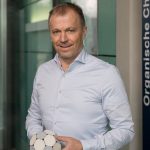 Energy Technology Division Research Award
Energy Technology Division Research Award
The Emerging Research Needs of Polymer Electrolyte Membrane Electrolysis Cells
By Bryan Pivovar
Bryan Pivovar is Senior Research Fellow and Electrochemical Engineering and Materials Chemistry Group Manager in the Chemistry and Nanosciences Center at the National Renewable Energy Laboratory (NREL), where he oversees NREL’s electrolysis and fuel cell and materials R&D. A pioneer in several areas of fuel cell development, he has taken on leadership roles and organized workshops in the areas of subfreezing effects, alkaline membrane fuel cells (2006, 2011, 2016, and 2019), and renewable hydrogen at the gigaton scale (2019). Pivovar co-chaired the Gordon Research Conference-Fuel Cells (2007) and will chair the 3rd International Conference on Electrolysis in 2021. He was responsible for leading a multinational laboratory team pursuing “Hydrogen at Scale,” investigating the energy system-wide benefits of increased hydrogen utilization. Pivovar was recently named Director for a major US Department of Energy Consortium (minimum of $50M over five years), H2NEW (Hydrogen [H2] from Next-generation Electrolyzers of Water), focused on addressing components, materials integration, and manufacturing R&D to enable manufacturable electrolyzers that meet required cost, durability, and performance targets, simultaneously, in order to enable $2/kg hydrogen. He received his PhD in chemical engineering from the University of Minnesota, U.S. Prior to joining NREL, he led fuel cell R&D at Los Alamos National Laboratory. He received the 2012 ECS Tobias Young Investigator Award and has coauthored over 150 papers with over 10,000 citations in the general area of fuel cells and electrolysis.
 Energy Technology Division Graduate Student Award sponsored by Bio-Logic
Energy Technology Division Graduate Student Award sponsored by Bio-Logic
Understanding Charge Transport for Current and Future Electrochemical Energy Storage Technologies
By Lisa Housel
Lisa M. Housel is currently a fifth year PhD candidate in Chemistry at Stony Brook University, U.S., under the mentorship of Drs. Esther S. Takeuchi, Kenneth J. Takeuchi, and Amy C. Marschilok. Housel’s graduate research aims to understand the impact of charge transport properties on the structural change and electrochemistry of different battery materials. Specifically, synchrotron-based operando methods have enabled Housel to probe structural and chemical changes of battery materials during electrochemical reduction and oxidation. Housel’s graduate work has resulted in over 20 publications including multiple publications in the Journal of The Electrochemical Society. She received her BS in Chemistry and Economics at Muhlenberg College, U.S.
 Energy Technology Division Graduate Student Award sponsored by Bio-Logic
Energy Technology Division Graduate Student Award sponsored by Bio-Logic
Designer Porous Carbon Electrodes for Redox Flow Batteries
By Charles Wan
Charles Tai-Chieh Wan is a PhD candidate in the Department of Chemical Engineering at the Massachusetts Institute of Technology, U.S., under the co-supervision of Professors Fikile R. Brushett and Yet-Ming Chiang. Wan’s graduate thesis focuses on developing designer electrode microstructures and surfaces for redox flow batteries by advancing unconventional yet potentially beneficial paradigms. His research efforts include leveraging principles of phase separation to synthesize and probe new electrode microstructures, investigating thin film organic coatings to mediate the electrode-electrolyte interface, and examining biomass-derived materials for use in redox flow batteries. Wan received his BS Summa Cum Laude in Chemical and Biomolecular Engineering at Cornell University, U.S. (2017).
 Energy Technology Division Supramaniam Srinivasan Young Investigator Award
Energy Technology Division Supramaniam Srinivasan Young Investigator Award
Rethinking Catalyst Layer Design: Interplay between Activity and Durability for Polymer Electrolyte Fuel Cells
By Iryna Zenyuk
Iryna Zenyuk is Associate Professor of Chemical and Biomolecular Engineering, University of California, Irvine (UCI), U.S. Zenyuk’s group focuses on enabling energy solutions by researching low-temperature hydrogen fuel-cells, Li-metal batteries, and electrolyzers. She works on design strategy encompassing novel materials, diagnostic tools and device-level testing. Zenyuk completed her BS in Mechanical Engineering at the New York University Tandon School of Engineering, U.S. (2008). She holds a PhD in Mechanical Engineering from Carnegie Mellon University, U.S. (2013), where she also received her MS (2011). Zenyuk’s graduate work focused on fundamental understanding of electric double layers in electrochemical energy-conversion systems. After a postdoctoral fellowship in the Electrochemical Technologies Group, Lawrence Berkeley National Laboratory, Zenyuk joined the Mechanical Engineering Department faculty at Tufts University, U.S., in 2015. In July 2018, she joined the UCI Department of Chemical and Biomolecular Engineering and is also an Associate Director of the National Fuel Cell Research Center. Zenyuk received the ECS Energy Technology Division Srinivasan Young Investigator Award (2021); UCI Samueli School of Engineering Early Career Faculty Excellence in Research Award (2019); ECS Toyota Young Investigator Award (2018); Research Corporation for Science Advancement, Scialog Fellow in Advanced Energy Storage (2017-2019); NSF CAREER award (2017); and Interpore Society Fraunhofer Award for Young Researchers (2017). Prof. Zenyuk has published over 60 journal publications and delivered more than 60 invited presentations on topics of energy conversion and storage.
 Industrial Electrochemistry and Electrochemical Engineering Division H. H. Dow Memorial Student Achievement Award
Industrial Electrochemistry and Electrochemical Engineering Division H. H. Dow Memorial Student Achievement Award
Electrochemical Modeling
By Akshay Subramaniam
Akshay Subramaniam is currently a doctoral student in chemical engineering at the University of Washington (UW), U.S., co-advised by Profs. Venkat Subramanian and Dan Schwartz. Subramaniam’s research focuses on the development and application of electrochemical modeling and simulation tools, with an emphasis on next-generation Lithium metal batteries. He is engaged in developing multiscale continuum simulation frameworks to advance understanding of the effect of external pressure and deformation effects on the overall performance and lifetime of Lithium metal cells. In doing so, he intends to leverage detailed electrochemical models and robust simulation approaches to correlate practically relevant cell-level variables with internal electrochemistry. A secondary goal is the development of accessible design and validation tools to better inform experimental studies. Subramaniam is also engaged in more applied research on the development of reduced-order modeling techniques that can convert detailed models into computationally efficient forms that greatly increase their utility in real-time prediction, control, and optimization applications. Subramaniam has been part of multiple academic and industrial collaborations including the Battery 500 consortium. Subramaniam received a BS from the Institute of Chemical Technology, India, in 2013, followed by a Masters’ degree from the Indian Institute of Technology Bombay, India, in 2016. He has co-authored seven peer-reviewed publications, with more manuscripts under preparation. He received UW departmental fellowships in 2017 and the UW Clean Energy Institute Graduate Fellowship in 2018.
 Industrial Electrochemistry and Electrochemical Engineering Division Student Achievement Award
Industrial Electrochemistry and Electrochemical Engineering Division Student Achievement Award
Mass Spectrometry Titration for Quantitative Probing of Lithium Plating and Solid-Electrolyte Interphase Formation
By Eric McShane
Eric McShane is pursuing a PhD at the University of California, Berkeley, U.S., where, in the fall of 2016, he joined the McCloskey Laboratory to study the kinetic, transport, and degradation phenomena underpinning lithium-ion battery operation during fast charge. He received his BS in Chemical and Biomolecular Engineering from Cornell University, U.S., in 2016. There, as part of the Rawling Cornell Presidential Research Scholars Program, he worked as an undergraduate researcher studying scalable synthesis methods for Si and Ge nanowires in the Hanrath Energy Lab. McShane received the NSF Graduate Research Fellowship and Outstanding Graduate Student Instructor Award.
 Nanocarbons Division SES Young Investigator Award
Nanocarbons Division SES Young Investigator Award
Nanomaterials Engineering to Probe and Control Living Systems
By Markita Landry
Markita Landry is Assistant Professor in the Department of Chemical and Biomolecular Engineering at the University of California, Berkeley, U.S. Her current research centers on the development of synthetic nanoparticle-polymer conjugates for imaging neuromodulation in the brain, and for the delivery of genetic materials into plants for plant biotechnology applications. The Landry Lab exploits the highly tunable chemical and physical properties of nanomaterials for the creation of biomimetic structures, molecular imaging, and plant genome editing. She received a PhD in Chemical Physics and Certificate in Business Administration from the University of Illinois at Urbana-Champaign, U.S., after obtaining a BS in Chemistry and BA in Physics at the University of North Carolina at Chapel Hill, U.S. Landry completed an NSF Postdoctoral Fellowship in Chemical Engineering at the Massachusetts Institute of Technology, U.S. Landry is on the Scientific Advisory Board of Terramera, Inc. She is a recent recipient of early career awards from the Brain and Behavior Research Foundation, Burroughs Wellcome Fund, The Parkinson’s Disease Foundation, DARPA Young Investigator program, Beckman Young Investigator program, and Howard Hughes Medical Institute. Landry is a Sloan Research Fellow, FFAR New Innovator, and Chan-Zuckerberg Biohub Investigator.
 Nanocarbons Division Robert C. Haddon Research Award
Nanocarbons Division Robert C. Haddon Research Award
Chemical Functionalization of Synthetic Carbon Allotropes
By Andreas Hirsch
Andreas Hirsch is Chair of Organic Chemistry II at the Friedrich-Alexander-Universität Erlangen-Nürnberg, Germany, and Coordinator of the Graduate School of Molecular Science (GSMS), Interdisciplinary Center for Molecular Materials (ICMM), and Synthetic Carbon Allotropes Collaborative Research Center. Hirsch’s laboratory has pioneered and is at the forefront of carbon allotrope chemistry and is known for the investigations of basic principles for the functionalization of the 0-dimensional fullerenes, 1-dimensional carbon nanotubes, and 2-dimensional graphene, which lead to the synthesis of numerous examples of derivatives with tailor-made structural, electronic, photophysical, and biomedical properties. These studies extend to new 2D-materials including black phosphorus and transition metal dichalcogenides. Hirsch received his PhD from Universität Tübingen, Germany (1990), then completed a postdoctoral fellowship in Prof. Wudl’s group at the Institute for Polymers and Organic Solids, University of California, Santa Barbara, U.S. (1990-1991). He worked as a research associate at the Institut für Organische Chemie Universität Tübingen, Germany. After receiving his Doctor Habilitus in 1994, Hirsch joined the chemistry faculty at the Karlsruher Institut für Technologie, Germany, as Professor of Organic Chemistry. In 1995, he moved to the Friedrich-Alexander-Universität Erlangen-Nürnberg, Germany. Hirsch is an elected member of the Bayerische Akademie der Wissenschaften and received two ERC Advanced Grants (2010 and 2017), the Max Grundig Award (2012), Medal of the Organic Institute of the Academy of Sciences of the Czech Republic (2012), and Elhuyar-Goldschmidt-Prize of the Spanish and German Chemical Societies (2006).
 Organic and Biological Electrochemistry Division Manuel M. Baizer Award
Organic and Biological Electrochemistry Division Manuel M. Baizer Award
Concepts for Electrifying Organic Synthesis
By Siegfried R. Waldvogel
Siegfried R. Waldvogel received the 2020 ECS Organic and Biological Electrochemistry Division Manuel M. Baizer Award in recognition of his significant contributions to the field of organic electrochemistry. Waldvogel is currently Professor of Chemistry at the Johannes Gutenberg-Universität Mainz, Germany, and Director of the Gutenberg-Universität Forschungskollegs. His research focuses on organic electrochemistry, oxidative coupling reactions with MoV-reagents, and supramolecular sensing. Waldvogel holds a PhD from the Ruhr-Universität Bochum/Max-Planck-Institut für Kohlenforschung, Germany. He received a DAAD/NATO Fellowship for his post doctorate research in the Julius Rebek Jr. Lab at the Scripps Research Institute, U.S.
Waldvogel has presented seminars at ECS meetings and published in ECS journals. He has received many awards including the Novartis Chemistry Lecture Award (2019/2020), International Society of Electrochemistry Jaroslav Heyrovsky Prize for Molecular Electrochemistry (2018), and Zukunftspreis Pfalz (2013). Waldvogel is a member of the Executive Board of the GDCh-Division of Sustainable Chemistry. He is the author of almost 220 publications and holds patents on anodic and cathodic transformations.
 Physical and Analytical Electrochemistry Division David C. Grahame Award
Physical and Analytical Electrochemistry Division David C. Grahame Award
My 54 Years of Doing Electrochemistry and What Is New
By Bruce Parkinson
Bruce Parkinson is the J. E. Warren Professor of Energy and Environment in the Department of Chemistry and the School of Energy Resources at the University of Wyoming, U.S. His current research covers a wide range of areas including electrochemistry, materials chemistry, nanomaterials, photoelectrochemistry on the surface of Mars, and recently on membrane applications of new two-dimensional organic framework materials. Parkinson completed a BS in Chemistry at Iowa State University, U.S. (1972), where he pursued undergraduate research with Prof. Dennis Johnson on rotating electrodes. He then went on to the California Institute of Technology where under the guidance of Prof. Fred Anson he earned his PhD in 1977, working on double layer effects on electrode kinetics and surface phase formation on mercury electrodes. Parkinson worked on semiconductor photoelectrochemistry for his post-doctoral studies at Bell Laboratories with Adam Heller and Barry Miller. He was a Staff Scientist at the Ames Laboratory from 1979-1981 and then moved on to the Solar Energy Research Institute (now known as the National Renewable Energy Laboratory) where he was a Senior Scientist working on solar energy conversion. He then joined the Central Research and Development Department of the DuPont Company in 1985. In 1991, he became Professor of Chemistry at Colorado State University, U.S., until joining the University of Wyoming faculty in 2008. Parkinson is a Fellow of the Electrochemical Society and Fellow of the American Association for the Advancement of Science. He received the Alexander von Humboldt Foundation Research Award in 2015. He has more than 260 publications in peer-reviewed journals and holds five US patents.





